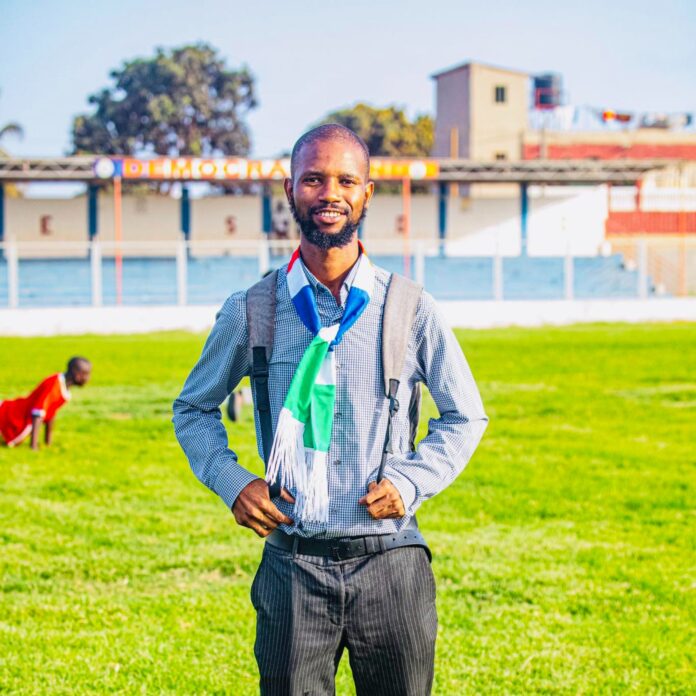Written by: Seringe S.T. Touray
This Sunday afternoon at Kairaba Police Station I met Ebrima Jallow, The Ghetto Pen. He was in detention alongside GALA members Musa Sanyang, Ebrima Keita, and Musa Sisoho. Others from the PURA protest are being held at Bakoteh and Kotu police stations. He said he remains resilient, that the youths must not relent, and urged supporters to continue taking to the streets to demand the release of protesters.
At Kairaba, officers facilitated direct access during the visit and arranged a way to reach the detainees remotely afterwards. Jallow and his colleagues described their treatment in custody as respectful, with ample food and refreshments supplied by supporters. Their account of the arrests, however, was different in tone. They alleged that some officers deployed at the protest scenes used unnecessary force against protesters.
This latest round of detentions follows the regulator’s move to impose a floor price of fifty dalasis per gigabyte for mobile data. PURA presented the measure as stabilising, yet the backlash has been swift and substantial. The Gambia Competition and Consumer Protection Commission urged its suspension, arguing that recent competition had finally delivered affordable rates for households and small businesses.
A civil society coalition that includes the Edward Francis Small Centre for Rights and Justice, GALA, and Team Gom Sa Bopa has demanded publication of the cost model and the benchmarking PURA relied upon, and called for the measure to be reversed. These objections go to the essence of regulatory legitimacy and transparency.
Public frustration has been building for years over expensive and unreliable internet services. When competitive offers pushed prices down, consumers embraced the relief. In that context, a sudden price floor might look less like prudence and more like protection of corporate revenue. Legal authority to regulate prices exists, but legitimacy rests on transparent consultation and a persuasive demonstration that consumer welfare is paramount. Without the promised disclosures, confidence erodes and suspicion proliferates.
On Thursday August 21st, the police warned that no request had been received for a protest at the PURA headquarters on Kairaba Avenue the next day, and that any unauthorised gathering would face enforcement. On Friday August 22nd, nineteen people were arrested outside the complex near the United States Embassy.
The next day, bail was opened. Three detainees accepted the conditions and were released, while the others declined and asked for unconditional release. The police indicated they would be taken to court for bail. Police Public Relations Officer ASP Modou Musa Sisawo told The Fatu Network that at the time of arrest Jallow was taken to Kairaba Police Station. The police list of arrestees includes the rapper Killa Ace, Ali Cham, who is held at a different station.
The dispute over permitting is real, yet it does not fully answer the question of proportionality. Many present describe citizens standing with signs outside a public building. A confident state can enforce the law and protect order, while still facilitating peaceful assembly. Doing so lowers the temperature, invites rigorous scrutiny of competing claims, and helps the country move forward with fewer bruises.
Jallow’s personal arc gives the story its human centre. He was at Westfield the day after the arrests, almost alone, and still called on others to come. His record this year already includes petitions on Jammeh era asset sales, football governance, and public health. The method is consistent. Write, sign, show up, and accept the consequences. Supporters view that as principled civic action. Critics argue that process rules matter and should be followed. Both positions can coexist, and both benefit from open information and fair, even handed policing.
There is a practical path through the policy dispute. PURA could publish the full cost model and the benchmarking details it cited, along with a timetable for measurable improvements in quality of service. The GCCPC, the regulator, operators, and consumer groups could convene to align affordability with investment, and agree on tools other than higher prices to improve quality. Clear commitments on coverage, speed, and billing transparency could turn a polarising decision into a public conversation grounded in verifiable facts.
As of this writing, Jallow remains in custody at Kairaba. He says he is resolute. Detainees report respectful treatment at the station, while alleging excessive force during some arrests. How the coming days are handled will say much about how The Gambia balances order, rights, and the public’s need for affordable internet and the freedom to argue for it in public.




